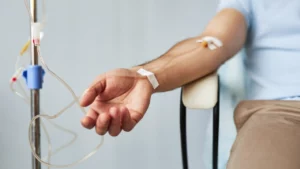What are menstrual problems?
Every single adult woman you know has dealt with some degree of menstrual problems or will do so at a later stage in her life. Our bodies are constantly changing, and as we grow older, our hormone production fluctuates as well, impacting our bodies on the inside out.
Not everyone experiences the same menstrual concerns, and neither do they do so at the same ages. While some may have a smooth few teenage years, others may experience a lot of discomfort in the few years right after they get their first period.
The most common problems associated with menstruation are those that come along with PMS or premenstrual syndrome. The symptoms include bloating, cramping, fatigue, changes in appetite and a dip in energy levels amongst others.
The link between menstrual problems and PCOS
PCOS, also known as Polycystic Ovary Syndrome, is a hormonal imbalance that women may suffer from, wherein androgens, the male hormones, are in excess capacity than normal.
PCOS can cause multiple menstrual problems such as irregular or missed periods due to irregular functioning of the ovaries. The egg that develops in the ovaries month on month may not develop optimally or may not release during ovulation. This can lead to other concerns such as blood clots, heavy bleeding while menstruating and excessive period pain.
Premenstrual syndrome
Premenstrual syndrome can occur anywhere between a week to 10 days prior to your period. Some of the most common signs of the premenstrual syndrome include:
- Moodiness
- Bloating
- Cramping
- Food cravings
- Acne
- Excess skin sebum production
- Fatigue and lower energy levels
- Anxiety
- Diarrhoea or constipation
Heavy periods
A heavier than usual period can be extremely uncomfortable and can interfere with your daily life and schedule. The condition where you experience a heavier period than usual is called menorrhagia and can be caused due to a hormonal imbalance.
Additionally, heavy bleeding can also be the result of the onset of puberty, conditions like thyroid or endometriosis, infections in the vagina or a sudden lifestyle or diet change, or even a new fitness routine.
Absent periods
The opposite end of the above mentioned concern, you may skip your period altogether. If you don’t get your period till the age of 16 or don’t get them for a few months together, this may be due to a condition called amenorrhea.
This can occur due to multiple reasons when you’re younger, in your teens, including but not limited to, a poor diet or anorexia, pregnancy, cysts in your ovaries, thyroid, or if you suddenly stop taking birth control pills.
Your gynaecologist can help you understand what is going on, along with offering you the ideal treatment plan to get them on track. If you’re older, conditions like menopause, other ovarian disorders and childbirth-related reasons such as pregnancy and breastfeeding are cited for the same.
Painful periods
While the usual amount of cramping and back or stomach pain is a part of menstruation—you will know what is normal for your body when you track the same over a few period cycles—an unnatural amount of pain could be a signifier for other concerns.
Experiencing an unbearable amount of pain and having to resort to painkillers very often warrants further inspection by your gynaecologist. Known as dysmenorrhea, very painful periods may be caused due to the presence of fibroids, undetected endometriosis or inflammation in your body.
Diagnosing menstrual problems
There is no single menstrual cycle that is characterised as normal. Your period cycle could be anywhere between 4-7 days, and that of another friend or family member may very well be different from yours.
It’s important to keep track of your menstrual cycle and the symptoms you experience before and during. Period tracking apps or even the health app on your phone can help you keep track of the same.
If you find that you’re experiencing more or less than normal bleeding, variations in pain or bloating, excessive breakouts or even weakness, it’s important to get yourself checked out by your gynaecologist to rule out any other pressing health concerns you may be dealing with.
It’s important that you remain 100% transparent with your gynaecologist about your lifestyle, sexual activity and all symptoms you may be experiencing for an accurate diagnosis.
Treatment
A consultation with your gynaecologist or even a general practitioner at first can help you understand what you may be dealing with in terms of menstrual concerns. Further investigation which can include blood tests and a possible sonography can reveal your menstrual concern, after which you will be prescribed the right course of action by your doctor.
This could include getting on or off birth control pills, a dietary or lifestyle change, and of course, other courses of treatment for concerns like PCOS, PCOD or thyroid.







